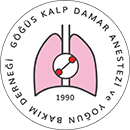

Early versus Late Application of Hemoadsorption in Critically Ill COVID-19 Patients with Cytokine Release Syndrome
Berrin Er1, Sema Turan1, Hayriye Cankar Dal1, Çilem Bayındır Dicle1, Nilgün Eren Çakaroğlu2, Şeyda Özkan2, Dilek Kazancı11Department of Intensive Care Unit, University of Health Sciences, Ankara Bilkent City Hospital, Ankara, Türkiye2Department of Anaesthesiology and Reanimation, University of Health Sciences, Ankara Bilkent City Hospital, Ankara, Türkiye
Objectives: Cytokine release triggered by severe acute respiratory syndrome-coronavirus 2 (SARS-CoV-2) depends on a dysregulated immune response and is associated with high mortality. Extracorporeal cytokine hemoadsorption (HA) can be considered a possible adjuvant therapy. This study aimed to review the outcomes of critically ill patients with COVID-19 treated with HA and analyze possible factors associated with mortality.
Methods: Data of patients who received HA for at least one cycle from April 17, 2020, to January 31, 2021, were collected. Clinical and laboratory features were recorded, and mortality was evaluated based on the extracorporeal treatment application time and intensive care units (ICU) admission.
Results: Data from 177 patients among 4733 ICU patients were analyzed. Their mean age was 60.9±10.9, and 40 (22.6%) of them were females. About 83% of them were mechanically ventilated, and the overall mortality was 76%. In univariate analysis, the mean age, median acute physiology and chronic health evaluation (APACHE)-II score, respiratory support rate, and duration between ICU admission and first cytokine filter were lower in the survivor group than in the non-survivor group. In binary logistic regression analysis, higher APACHE-II with an odds ratio of 1.06 (95% confidence interval [CI]: 1.0051.128, p=0.033), invasive mechanical ventilation with an odds ratio of 138.4 (95%CI: 24.2791.8, p<0.001), and later application of HA with an odds ratio of 1.190 (95%CI: 1.0091.404, p=0.039) were independently associated with in-hospital mortality.
Conclusion: Cytokine HA was applied to a large number of patients at our center. Although this was conducted in a severe population with high mortality, besides invasive mechanical ventilation, late application of the cytokine filter was found as one of the factors independently associated with higher mortality.
Manuscript Language: English
(317 downloaded)

















